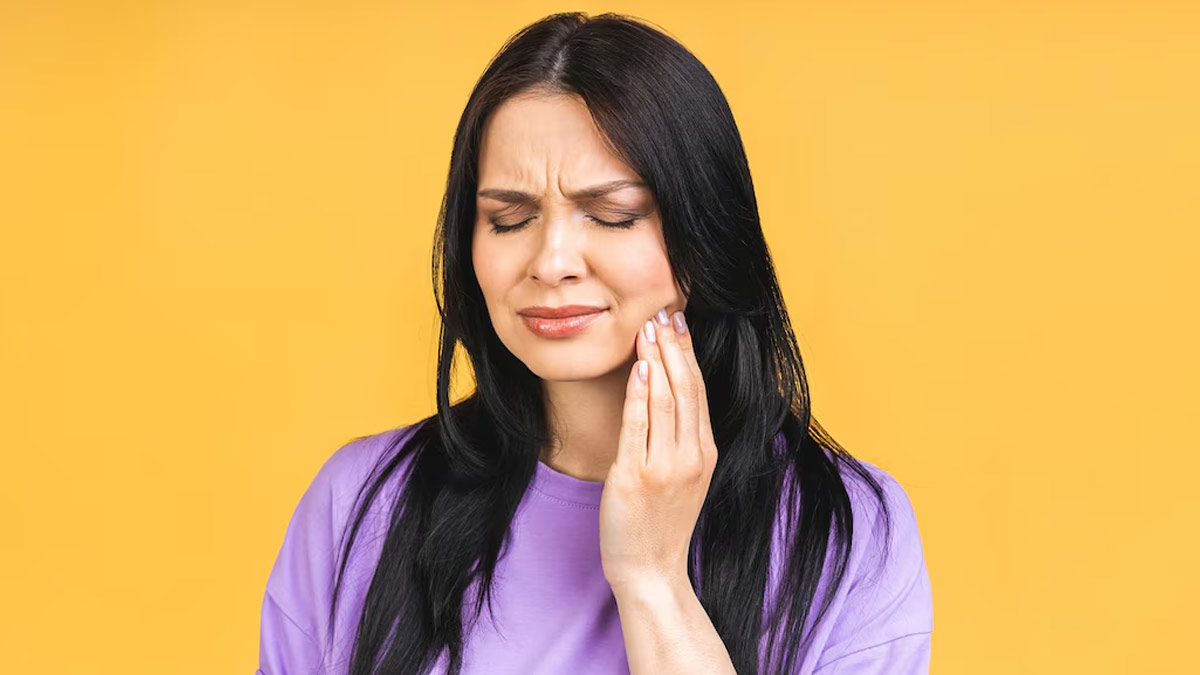
Most people often have a distressing experience during the occurrence of a wisdom tooth. Wisdom teeth are the last molars that usually erupt in your late teens or early twenties. They're located at the back of your mouth, two on the top and two on the bottom. While not everyone experiences wisdom tooth pain, those who do can find it disruptive to their daily lives. In this article, we list the causes of wisdom tooth pain and effective remedies that can help alleviate discomfort.
Table of Content:-
Causes of Wisdom Tooth Pain

Impaction
One of the most common causes of wisdom tooth pain is impaction, where the tooth becomes trapped beneath the gum line or grows in at an angle. According to a 2014 study, impacted wisdom teeth have the potential to induce inflammatory dental conditions characterised by pain and swelling in affected teeth. Furthermore, they can lead to damage to nearby teeth and bone tissue.
Infection
When wisdom teeth partially emerge through the gum line, it creates a small opening where bacteria can enter and cause an infection. This condition, known as pericoronitis, can result in pain, swelling, and difficulty opening the mouth.
Also Read: Oral Care: Expert Explains Tooth Polishing And Tooth Whitening And Their Affect On Your Oral Health

Crowding
The late eruption of wisdom teeth can lead to overcrowding in the mouth, especially if there isn't enough space for them to fully emerge. This crowding can throw the teeth out of line, leading to aches and pains that are downright uncomfortable.
Tooth Decay
Wisdom teeth, particularly those that are partially erupted, can be difficult to clean properly, making them more susceptible to tooth decay and cavities. Decay in wisdom teeth can cause pain and sensitivity.
Gum Disease
Poor oral hygiene and the inability to properly clean around wisdom teeth can increase the risk of gum disease, leading to inflammation, bleeding, and pain in the surrounding gums.
Effective Remedies to Prevent Wisdom Tooth Pain
.jpg)
Maintain Good Oral Hygiene
It is crucial to maintain good oral hygiene, which includes regular brushing, flossing, and rinsing with an antimicrobial mouthwash. This can help prevent the buildup of plaque and bacteria around wisdom teeth, reducing the risk of infection and decay.
Practice Warm Saltwater Rinse
Gently rinsing your mouth with warm saltwater can help reduce inflammation and pain associated with wisdom tooth eruption and infection. Saltwater has natural antiseptic properties that can promote healing. A study conducted in 2016 indicates that gargling warm water mixed with sodium chloride (salt) can aid in fostering gum health and eliminating detrimental bacteria.
Also Read: Toothbrush Could Be The Most Unhygienic Thing In Your Bathroom, Here Are 5 Mistakes To Avoid
Apply Ice Packs
Applying an ice pack to the outside of the cheek can help numb the area and reduce swelling associated with wisdom tooth pain. According to a 2019 study, placing an ice pack on the jaw can alleviate inflammation, potentially easing discomfort as a result. Make sure to wrap the ice pack in a cloth to prevent skin irritation.
Soft Diet
Consuming soft foods, such as soups, yoghurt, and mashed potatoes can help alleviate discomfort while chewing and reduce irritation around wisdom teeth. You should also refrain from consuming hard and crunchy foods that can aggravate pain.
Clove Oil
Clove oil has natural analgesic and antibacterial properties that can help relieve wisdom tooth pain and reduce inflammation. According to a 2018 study, it was found that eugenol, the primary component of clove oil, possesses anti-inflammatory, antimicrobial, and antioxidant properties. To use it as a remedy, apply a small amount of clove oil to the affected area using a cotton swab.
Tea Tree Oil
Another way to get rid of pain from wisdom teeth is using tea tree oil. According to a 2016 study, it is known for its antibacterial properties and has the potential to eliminate bacteria that accumulate on teeth. Dilute tea tree oil with a carrier oil like coconut oil and apply it to inflamed gums. Remember to avoid swallowing the mixture and rinse your mouth thoroughly after treatment to remove any residue.
What You Should Know
If wisdom tooth pain persists or worsens, it's essential to consult with a dentist for further evaluation and treatment. Depending on the underlying cause of the pain, treatment options may include antibiotics, dental extraction, or surgical removal of the wisdom teeth.
[Disclaimer: This article contains information for informational purposes only, hence, we advise you to consult your expert if you are dealing with any health issues to get the necessary treatment.]
Also watch this video
How we keep this article up to date:
We work with experts and keep a close eye on the latest in health and wellness. Whenever there is a new research or helpful information, we update our articles with accurate and useful advice.
Current Version